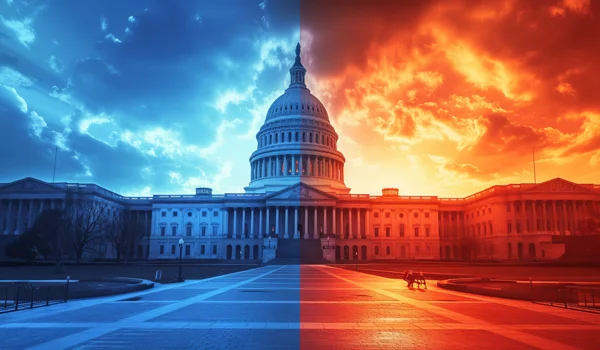
Nicolas Sopel
Chief Strategist
Quintet Private Bank Luxembourg
The US elections are just around the corner, and, at this juncture, it’s still nearly impossible to predict who’s going to be the 47th President of the United States of America, and which party will dominate the US Congress, which is so important for policymaking. No candidate has been able to take a strong lead in opinion polls, including in the decisive swing states. Polls are well within the margin of errors, so in a way, everything is possible, and everything is so uncertain. From domestic to foreign policies, the two candidates have opposing views, which could have different implications for the economy and for markets.
But markets don’t like uncertainty. With the presidential race so tight, and the outcome very much unpredictable, we expect some volatility as results start to come in. Rather than advocating knee jerk reactions to volatile incoming news, we seek to maintain composure. In this environment, we maintain a healthy dose of diversification.
We are pleased to share the exclusive thoughts of a series of leading experts on the potential impact of the election on markets, geopolitical landscape and economic policy. The thought leaders featured are:
- Daniele Antonucci, Co-Head of Investment and Chief Investment Officer at Quintet Private Bank
- Catherine Kress, Head of Geopolitical Research and Strategy at BlackRock
- Libby Cantrill, Head of Public Policy at PIMCO
- John B. Emerson, Vice Chairman of Capital Group and former US Ambassador to Germany
Daniele Antonucci
Co-Head of Investment & Chief Investment Officer at Quintet
The key question when you look at the US election is what happens to the fiscal bit. You don’t hear much about it in the political debates.
Uncertainty looms over the 47th US presidential elections, with rising fiscal deficits, debt and unknown foreign policies adding to the complexity. Regardless of the elections’ outcomes, discover how we apprehend this event by mitigating risks and leveraging growth opportunities.
Catherine Kress
Head of Geopolitical Research & Strategy at BlackRock
Neither party has prioritised tackling the budget deficit. We see persistent deficits as reinforcing our views around sticky inflation and higher for longer interest rate.
What are the main differences between the two candidates on key policies, fiscal, regulatory and trade? These divergences could have a different impact on markets. Discover in this video what’s our partner BlackRock’s take on the US elections.
Libby Cantrill
Head of US Public Policy at PIMCO
The party that controls the White House doesn’t necessarily control either the House of Representatives or the Senate.
US voters aren’t just deciding on their next President, but also what the composition of the US Congress will look like. Discover how this composition could impact the policy plans each candidate, particularly around one of the key policy points: tax.
Former Ambassador John B. Emerson
Vice Chairman, Capital Group International
Every President in the United States thinks they’re putting America first, they just have different approaches as how to do it.
The next US President could have a significant effect on America’s engagement with our nations. Discover how a Harris or Trump administration could influence US alliances across the globe.
Our latest insights
Discover our insights into the latest investment news and trends. Find out the information you need to know to better understand how to invest and manage your money.
This document and the information and data that it contains relating to products, services or financial instruments, as well as any analyses, assessments, suppositions, judgements, opinions, and estimates presented therein (the “Information”) has been prepared by Quintet Private Bank (“Quintet”) for your exclusive and private use in the provision of personal investment advice by Quintet on the basis of your risk tolerance and suitability. Prior to any transaction or investment in the product, you should make your own appraisal of all the risks, including, but not limited to, the risks from a financial, legal, tax and accounting perspective, without relying exclusively on the Information contained in this document. Please note that the past performance of a financial instrument is not an indicator of its future performance. The Information may be changed at any time without advance notice or any notification being sent to you. Any projections and forecasts are based on a certain number of suppositions concerning the current and future market conditions and there is no guarantee that the expected result will ultimately be achieved. While the Information has been established on the basis of reliable sources and is therefore presumably correct at the date of publication of this document, it is provided with no guarantee, either express or implicit, as to its completeness, accuracy, authenticity, timeliness, validity or relevance and no liability is accepted by Quintet in this respect. This document and the Information, content, text and illustrations are the property of Quintet and/or third parties contractually linked to Quintet. It is forbidden to copy, publish, distribute, transmit or reproduce, either in whole or in part, the Information contained in this document.








